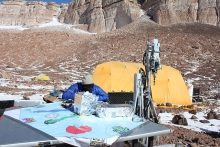The extremely salty, very cold, and almost oxygen-free environment under the permafrost of Lost Hammer Spring in Canada’s High Arctic is the one that most closely resembles certain areas on Mars. So, if you want to learn more about the kinds of life forms that could once have existed – or may still exist – on Mars, this is a good place to look. After much searching under extremely difficult conditions, McGill University researchers have found microbes that have never been identified before.


NASA’s science rover Perseverance, the most advanced astrobiology laboratory ever sent to another world, streaked through the Martian atmosphere on Thursday, February 18 and landed safely on the floor of a vast crater, its first stop on a search for traces of ancient microbial life on the Red Planet. (National Post)
Here are some experts from McGill University that can provide comment on this issue:
"A Mars orbiter has detected a wide lake of liquid water hidden below the planet’s southern ice sheets. There have been much-debated hints of tiny, ephemeral amounts of water on Mars before. But if confirmed, this lake marks the first discovery of a long-lasting cache of the liquid." (Science News)

“There are some indications that Mars, many billions of years ago, was much warmer – and much wetter,” explained Lyle White, a McGill professor. “Where it would have been an environment that we can envision it would have hosted life as we know on Earth.”
CTV News
Researchers demonstrate for the first time the potential of existing technology to directly detect and characterize life on Mars and other planets. The study, published in Frontiers in Microbiology, used miniaturized scientific instruments and new microbiology techniques to identify and examine microorganisms in the Canadian high Arctic - one of the closest analogs to Mars on Earth. By avoiding delays that come with having to return samples to a laboratory for analysis, the methodology could also be used on Earth to detect and identify pathogens during epidemics in remote areas.

Researchers demonstrate for the first time the potential of existing technology to directly detect and characterize life on Mars and other planets. The study, published in Frontiers in Microbiology, used miniaturized scientific instruments and new microbiology techniques to identify and examine microorganisms in the Canadian high Arctic — one of the closest analogs to Mars on Earth.
Professor Lyle White, Natural Resource Sciences, is interviewed on his role in Mars exploration and the Exomars Space Probe.
"It doesn't mean there's no life on Mars, but what it does mean is it's going to be harder to find," said Jacqueline Goordial, the McGill University researcher who led the study, in an interview with Rachelle Solomon on CBC's Breakaway.

Failure to find active microbes in coldest Antarctic soils has implications for search for life on Mars
Natural Resource Sciences professor Lyle Whyte and postdoctoral fellow Jackie Goordial talk about their research which suggests that it is unlikely that it is unlikely that there is any microbial life to be found on Mars.
By Katherine Gombay, McGill Newsroom
Failure to find active microbes in coldest Antarctic soils has implications for search for life on Mars

Weather, which changes day-to-day due to constant fluctuations in the atmosphere, and climate, which varies over decades, are familiar. More recently, a third regime, called “macroweather,” has been used to describe the relatively stable regime between weather and climate.

The temperature in the permafrost on Ellesmere Island in the Canadian high Arctic is nearly as cold as that of the surface of Mars. So the recent discovery by a McGill University led team of scientists of a bacterium that is able to thrive at –15ºC, the coldest temperature ever reported for bacterial growth, is exciting. The bacterium offers clues about some of the necessary preconditions for microbial life on both the Saturn moon Enceladus and Mars, where similar briny subzero conditions are thought to exist.

